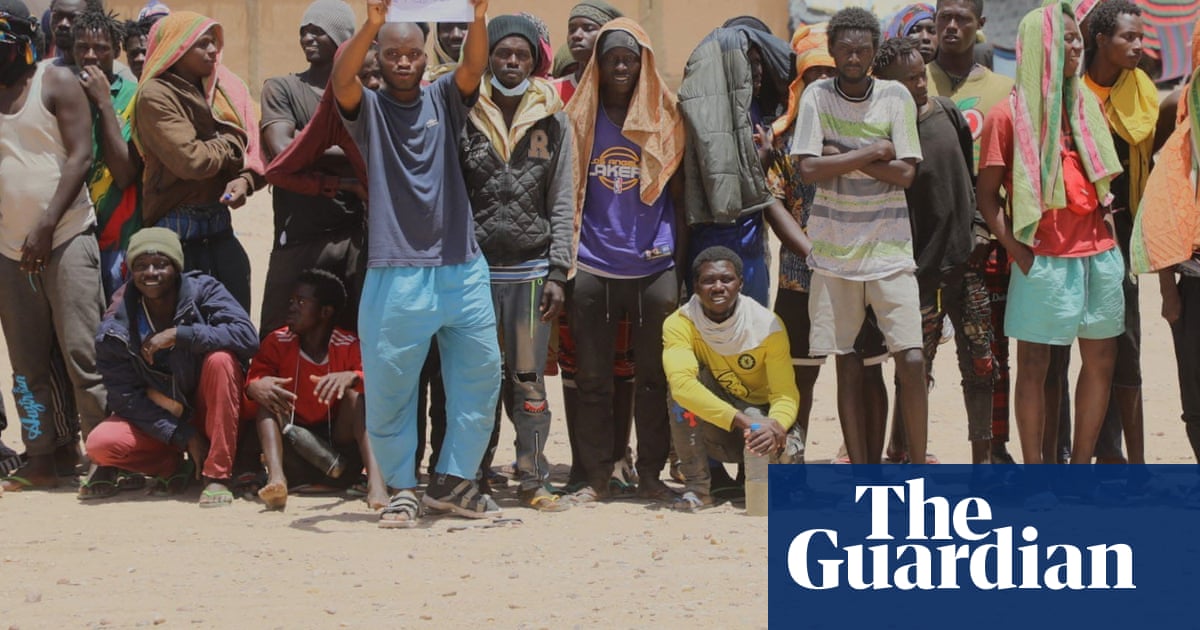There is no shade from the sun nor protection from sandstorms in the deserts ofNigerand so, for almost 300 days, the refugees stranded there have stood in protest with a single message: “We don’t want to stay here.”
About 15km (8 miles) from the nearest town of Agadez, the 2,000 refugees in the camp feel they have been isolated from the world, kept out of sight and earshot and abandoned by those they feel should be helping them – the Nigerien government, the EU and the UN’s refugee agency, UNHCR.
Many of the refugees have fled conflict in Sudan, but found their attempts to reach safety in Europe thwarted after beingpushed back by north African countriespaid by the EU to prevent people crossing the Mediterranean. Fearful, and reluctant to return to their home countries, they have become stranded in Niger.
While UNHCR says it does everything it can with the resources it has, the agency has become the focus for refugee frustrations in the camp, where they have little access to medical care or education. From July, they will no longer receive food aid.
“UNHCR’s role is very weak and they treat us without much humanity; they have little role in protecting us, which makes us vulnerable,” says Abdulmalik, a Sudanese man who says he has been in the camp for more than seven years.
Abdulmalik says there is no access to healthcare and that Nigerien authorities are heavy handed, beating and imprisoning refugees whenever they raise complaints. He himself was imprisoned in 2020 after a protest during which alarge part of the Agadez centre burned down.
“We live in a desert, 15km from the city without the most basic necessities of life. This is our suffering,” says Yousef Ismail, another Sudanese refugee who is part of the protests.
“Food was cut off[by UNHCR, at the request of the government]from us in February as punishment. A widowed woman was beaten just because she demanded her rights. In the same month, four refugees died due to the lack of a health centre,” says Ismail.
UNHCR has announcedthat because of funding shortfalls, from next month it will only provide food aid to the most vulnerable refugees in Agadez.
Sign up toGlobal Dispatch
Get a different world view with a roundup of the best news, features and pictures, curated by our global development team
after newsletter promotion
A UNHCR official who works in the region, who refused to be named, said they understand the frustrations, but that funding cuts and restrictions from the governments they work with limit the options. They said resettlements happen on an individual basis but the process is slowed because third countries, such as those in Europe, offer very limited numbers of spaces for refugees.
Moctar Dan Yaye, from Nigerien NGO Alarme Phone Sahara team, says he understands why the refugees are so frustrated with UNHCR and want to be relocated to safer countries.
“It’s normal for people being kept for years, who are not being integrated, to become frustrated and lose patience. UNHCR should use this and push others to help them,” he says.
Marc Montany, an activist who supported a refugee protest group in Libya, says UNHCR can often take a patronising approach to refugees and not take their concerns seriously.
“There’s a sense of disregard, really not treating them with the sensitivity required for people fleeing war and probably subjected to crimes against humanity,” he says.
Jeff Crisp, a former senior UNHCR official, says the agency finds it difficult to respond to discontent. “It has a tendency to resent what is perceived to be the ingratitude of people that it is trying to help. Some of its staff are quick to label refugee protesters as ‘troublemakers’.”
Even while the refugees in Niger have been protesting, more have arrived with reports of people beingrounded up and deportedfrom north Africa. Alarme Phone Sahara estimated that in Aprilmore than 2,000 peoplewere pushed back to Niger from Algeria andalmost 800 from Libya. It previously estimated31,000 were pushed back from Algeriain 2024.
“It’s unacceptable seeing people left in the desert. I can see it happen but can’t stop it. This is the unfairness of the EU policies – they say they care about human rights but then create these problems,” says Yaye.
The best public interest journalism relies on first-hand accounts from people in the know.
If you have something to share on this subject you can contact us confidentially using the following methods.
Secure Messaging in the Guardian app
The Guardian app has a tool to send tips about stories. Messages are end to end encrypted and concealed within the routine activity that every Guardian mobile app performs. This prevents an observer from knowing that you are communicating with us at all, let alone what is being said.
If you don't already have the Guardian app, download it (iOS/Android) and go to the menu. Select 'Secure Messaging'.
SecureDrop, instant messengers, email, telephone and post
See our guide attheguardian.com/tipsfor alternative methods and the pros and cons of each.
